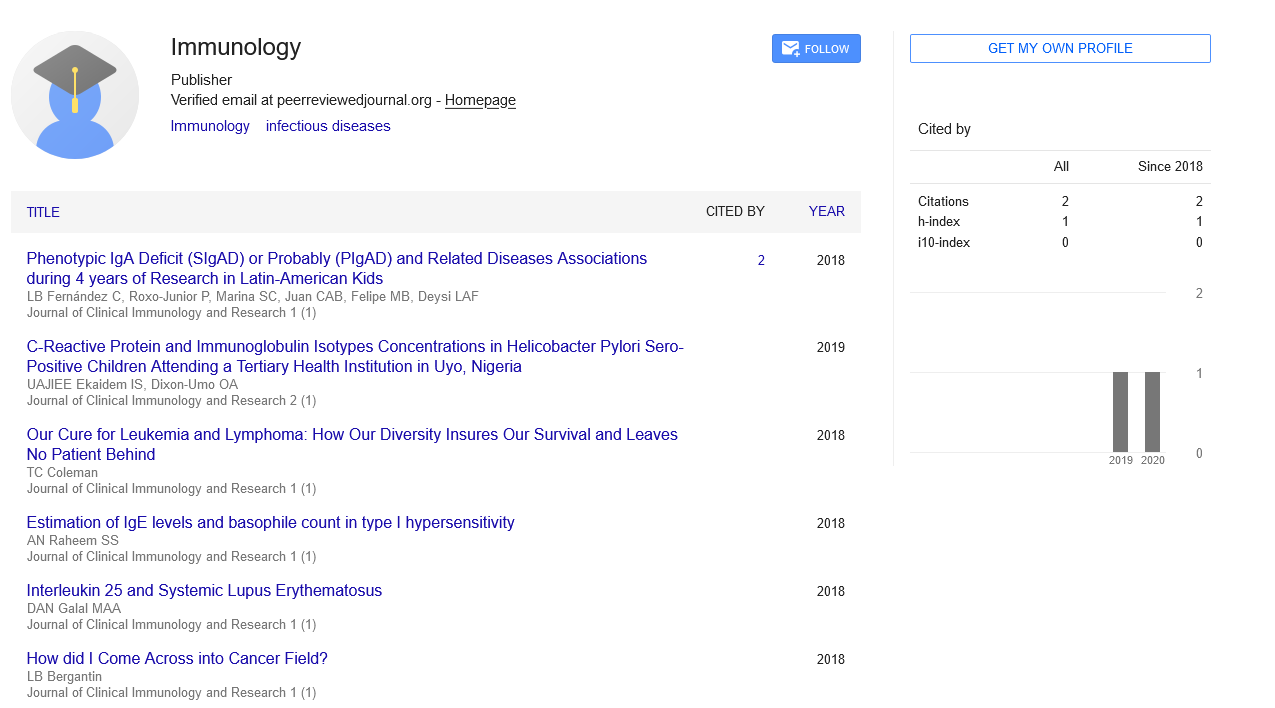Perspective, J Clin Immunol Res Vol: 4 Issue: 5
Cancer Immunology Progression and Development in Immune System
Keywords: Cancer, Immunosurveillance, Immunoediting
Description
Disease immunology is an interdisciplinary part of science that is worried about understanding the job of the insusceptible framework in the movement and improvement of malignant growth; the most notable application is malignant growth immunotherapy, which uses the resistant framework as a therapy for disease. Malignant growth immunosurveillance and immunoediting depend on insurance against advancement of cancers in creature frameworks and distinguishing proof of focuses for safe acknowledgment of human disease. Cancers might communicate growth antigens that are perceived by the resistant framework and may instigate a safe reaction. These cancer antigens are either TSA (Tumor-explicit antigen) or TAA (Tumor-related antigen).
Cancer Explicit
Growth explicit antigens are antigens that just happen in cancer cells. TSAs can be results of oncoviruses like E6 and E7 proteins of Human papillomavirus, happening in cervical carcinoma, or EBNA-1 protein of EBV, happening in Burkitt's lymphoma cells. One more illustration of TSAs are unusual results of changed oncogenes (for example Ras protein) and enemies of oncogenes.
Cancer Related Antigens
Cancer related antigens are available in solid cells, yet for reasons unknown they likewise happen in growth cells. Be that as it may, they vary in amount, spot or time span of articulation. Oncofetal antigens are cancer related antigens communicated by undeveloped cells and by growths. Instances of oncofetal antigens are AFP (α-fetoprotein), created by hepatocellular carcinoma, or CEA (Carcinoembryonic Antigen), happening in ovarian and colon malignant growth. More cancer related antigens are HER2/neu, EGFR or MAGE-1. Malignant growth immunoediting is a cycle where insusceptible framework connects with cancer cells. It comprises of three stages: end, balance and departure. These stages are frequently alluded to as "the three Es" of malignant growth immunoediting. Both, versatile and intrinsic safe framework partake in immunoediting. In the disposal stage, the resistant reaction prompts annihilation of growth cells and in this manner to cancer concealment. Be that as it may, some cancer cells might acquire transformations, change their attributes and sidestep the resistant framework. These cells could enter the harmony stage, in which the resistant framework doesn't perceive all cancer cells, and yet the growth doesn't develop. This condition might prompt the period of departure, in which the growth acquires predominance over invulnerable framework, begins developing and lays out immunosuppressive climate. As an outcome of immunoediting, growth cell clones less receptive to the safe framework gain predominance in the cancer through time, as the perceived cells are disposed of. This interaction might be thought of as similar to Darwinian development, where cells containing supportive of oncogenic or immunosuppressive changes get by to give their transformations to little girl cells, which may themselves change and go through additional specific tension. This outcomes in the growth comprising of cells with diminished immunogenicity and can scarcely be wiped out. This peculiarity was demonstrated to occur because of immunotherapies of malignant growth patients. Experts in the field have speculated that 'apoptotic cell passing is inadequately immunogenic though necrotic cell demise is really immunogenic'. This is maybe in light of the fact that disease cells being killed by means of a necrotic cell passing pathway instigate an insusceptible reaction by setting off dendritic cells to develop, because of fiery reaction excitement. Then again, apoptosis is associated with slight modifications inside the plasma film making the perishing cells be alluring to phagocytic cells. In any case, various creature studies have shown the prevalence of immunization with apoptotic cells, contrasted with necrotic cells, in getting against cancer safe reactions. The scientists report that while killing malignant growth cells with this specialist take-up and show by antigen introducing dendritic cells is empowered, hence permitting a T-cell reaction which can contract cancers. Thusly, actuating cancer killing T-cells is essential for immunotherapy achievement. Nonetheless, progressed malignant growth patients with immunosuppression have left specialists in a quandary concerning how to enact their T-cells. The manner in which the host dendritic cells respond and take-up cancer antigens to present to CD4+ and CD8+ T-cells is the way to achievement of the therapy.
 Spanish
Spanish  Chinese
Chinese  Russian
Russian  German
German  French
French  Japanese
Japanese  Portuguese
Portuguese  Hindi
Hindi 